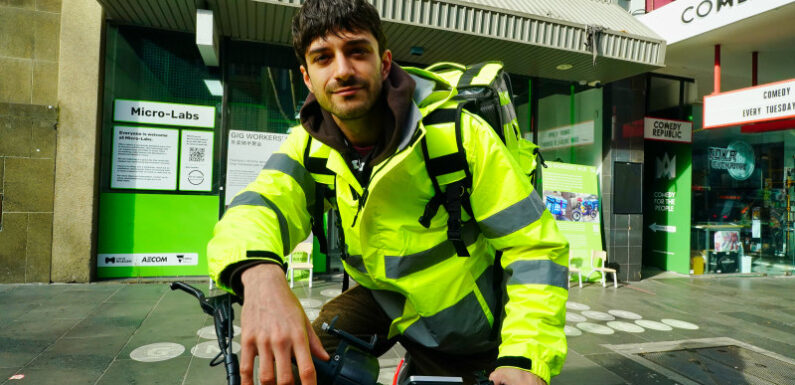
Save articles for later
Add articles to your saved list and come back to them any time.
Key points
- Melbourne’s deliver food drivers have no choice but to use fast food outlets as makeshift offices to access basic facilities like toilets.
- Monash University PhD student Andrew Copolov initiated a pilot program, The Gig Workers Hub, on Bourke Street that is being supported by the City of Melbourne.
- The Gig Workers Hub has bathrooms, a kitchen and charging points, as well as free food and drinks for delivery drivers to use during their busy shifts.
Every day across the city, food delivery workers are manoeuvring their way through streets and laneways on bicycles and scooters – some even on foot – as they drop off thousands of dishes and drinks to Melburnians.
Yet without a designated place to stop and rest or eat – unlike other city workers – drivers are forced to use fast food outlets and shopping centre food courts as their version of an office. These meeting places are opportunities to use a toilet, grab a bite to eat, and chat with fellow delivery drivers.
Former food delivery driver Satyam Jayani had no choice but to use McDonald’s toilets during his breaks.Credit: Luis Enrique Ascui
Satyam Jayani, 29, a former food delivery driver and international student originally from Gujarat, India, said 24-hour McDonald’s restaurants were often his only choice for a break during busy late-night shifts and even then, they came with a caveat.
“Some of the 24/7 McDonald’s toilets close at around 1-2 am, so it wasn’t always a guarantee,” Jayani recalled from his 18-month stint as a delivery driver for DoorDash and Uber Eats.
“McDonald’s on Chapel Street, Prahran, the one in Richmond, and also Elsternwick are hot spots for delivery drivers,” he said.
Jayani said those outlets never complained about the drivers, as they’d often use the amenities before returning to the car park to avoid disturbing customers and employees.
Monash PhD student Andrew Copolov outside the Gig Workers Hub on Bourke Street. Credit: Luis Enrique Ascui
“That’s the good thing about McDonald’s, they never got annoyed at us and if it wasn’t busy, we would sit inside,” he said.
Now the City of Melbourne is piloting a four-month program to support gig workers at the council-owned Micro-Labs building – a multipurpose hub to provide drivers with a place to rest and meet other drivers.
The hub is equipped with amenities including bathrooms, a kitchen and charging points, as well as free food and drinks, providing refuge for workers during extreme weather climate events.
The initiative is led by Andrew Copolov, a Monash University architecture PhD student who came up with the idea as part of his research into social infrastructure and how food delivery riders in Melbourne use and understand the city.
Copolov said the industry has left behind the city’s “invisible” gig workers.
“We should be building spaces of congregation for food delivery riders that will give a sense of dignity for them,” said Copolov, who also works casually as a food delivery driver while completing his studies.
“The labour of people like seafarers, Amazon workers, truck drivers, and food delivery drivers is labour that isn’t really seen or appreciated,” he said.
Copolov also said a space for delivery drivers was necessary to foster solidarity.
Inside the Gig Workers Hub at Micro-Labs on Bourke Street.Credit: Luis Enrique Ascui
“No changes to poor conditions for drivers will come if people are isolated,” he said.
In May, the state government launched the Gig Worker Support Service, the first of its kind in Australia.
The dedicated hotline operates from Monday to Friday for workers across transport and food delivery, disability support, aged care and IT, offering advice on their rights, protections and entitlements under workplace and other related laws.
Representatives of the government program have previously visited the Gig Workers’ Hub to offer their services.
The support service also offers advice to businesses on how to sign up and apply for the Fair Conduct and Accountability Standards, which is currently on a voluntary basis.
City of Melbourne Acting Lord Mayor Nicholas Reece said the council would assess the hub’s viability after the pilot program ends.
“Gig workers play a vital role in keeping our city moving, connecting thousands of local businesses with customers across Melbourne,” Reece said.
“Over the next six months, we’ll continue to monitor trends and assess how we can better support Melbourne’s gig economy community into the future.”
The hub is open at 227-229 Bourke Street on Thursdays and Sundays between 2pm and 5pm until the end of the year.
Get the day’s breaking news, entertainment ideas and a long read to enjoy. Sign up to receive our Evening Edition newsletter here.
Most Viewed in National
From our partners
Source: Read Full Article


